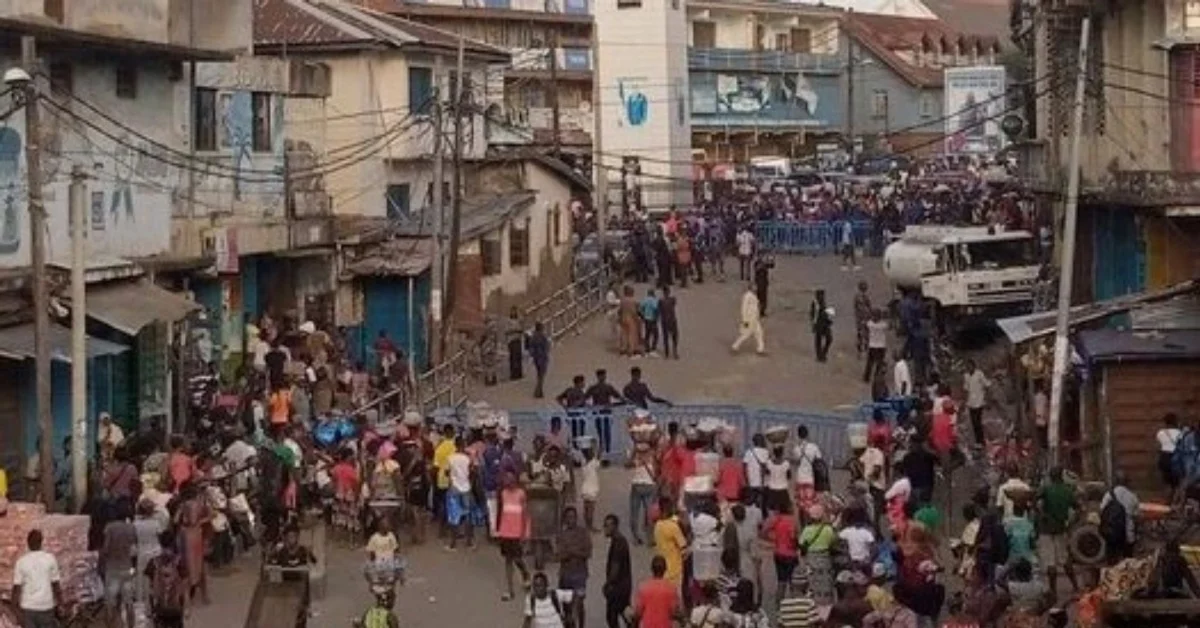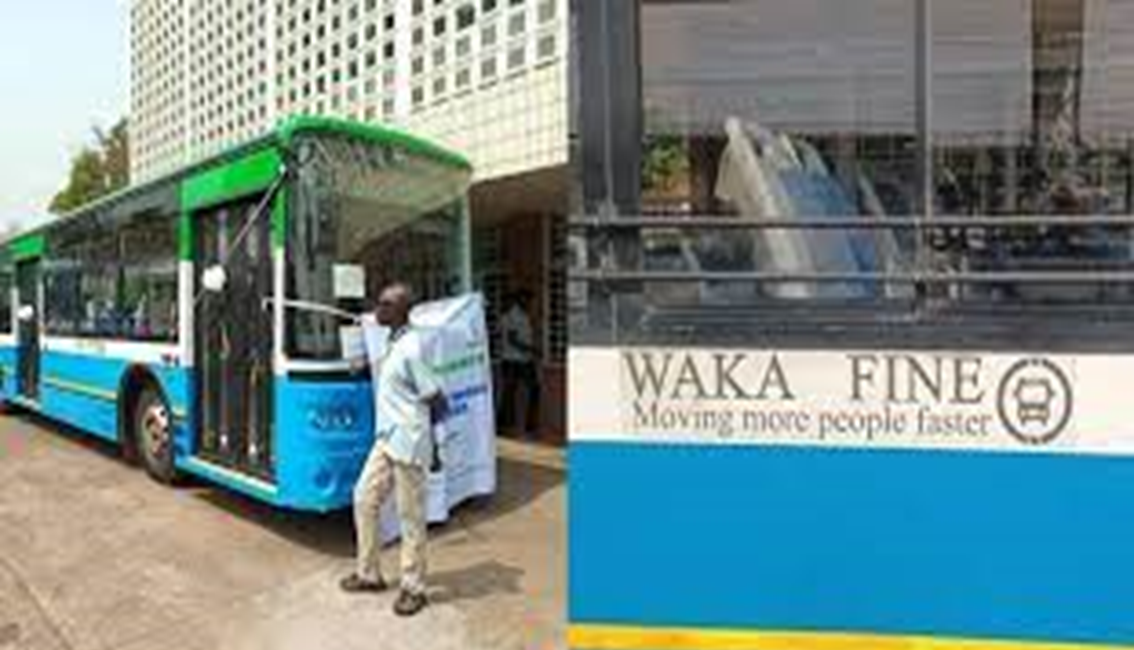On Thursday 27 July 2023, personnel of the Operational Support Division of the Sierra Leone Police and General Duty officers and joined by representatives of the Freetown City Council descended on central Freetown and forced street traders off and broke down their market stalls on Sani Abacha among other streets in town. Thursday was a follow up to Wednesday when the city officials warned street traders to make room for vehicular traffic by moving their stalls or wares off the streets or roads. This resulted to the traders or market women demanding that if their stalls should move then shops should also not be allowed to open. Police officers were forced to shoot teargas on Sani Abacha Street, a scene that was reminiscent of the 10 August 2022 nationwide protest. Majority of businesses were closed on Thursday and Friday past.
It is interesting to note that somewhere in the corridors of power someone thought it wise to start decongesting Freetown by getting rid of street traders in the hope of facilitating the smooth flow of vehicular and human traffic.
The SLRA, SLRSA, Police, the FCC and stakeholders including some traders and commercial vehicle unions have often called for and joined forces to rid the streets of the traders that are supposedly responsible for adding to the huge vehicular and human traffic in Freetown.
While this is a laudable move, we however question its expected outcome, asking if it was well planned and can be considered as an exercise in futility.
For a long time, the above agencies watched and allowed the streets of Freetown to be used as marketplaces instead of demanding they use a central marketplace. The sidewalks that were set aside for pedestrians to walk have been allocated to traders. Today, apart from people, one can find motorbikes, tricycles (kekeh), sedans, trucks, buses, wheelbarrows, omolankay, you name it, on the streets. It has gotten so bad that motorbikes routinely ply one way streets going the wrong direction and when buses or cars either stop to offload or load passengers, the resulting human traffic is compounded by the many wheelbarrows and traders that occupy the sidewalks.
Presently, many streets in the busy central business districts have been reduced to ‘pull and put’; you pull you wares off the streets when cars are plying, you put them back after the vehicles have passed. This is the case with Abacha, Guard, Ecowas, Lumley, Sackville, Free, Back, Upper East, Malama Thomas and many other streets in Freetown. The situation is almost the same across Freetown Urban and Rural.
But looking at how enforcement of other byelaws have gone, including restricting motorbike riders from the CBD, the COVID-19 measures and the like, FORUM NEWS SL is at great pains to see how the authorities can convince us of effective and consistent enforcement of this decongestion byelaw.
The street traders and their supporters say Sierra Leoneans are an obedient lot who only need dedicated leaders to set commendable examples. Clearing the streets of traders is not a partisan issue. It cuts across party lines. To ensure its effectiveness would require its intention to be non-political. Making it political would pit one party or candidate who wants to rid the streets of traders against one who would obviously paint them, him / her as an enemy of progress that is unconcerned with how poor people earn a living. Obviously, street traders will vote for the latter and so make this exercise futile. Devoid of political interference, enforcement of the byelaw would call for daily and consistent monitoring and enforcement, and moving traders to a central location they can trade from.
But are street traders the only group that this government will focus on? Are they the only causers of the congestion that is plaguing the city? Freetown CBD is facing a serious space crisis that has seen a rise in people, businesses, and vehicles without the subsequent rise in land-space to accommodate such increases. Try walking on Abacha, Malama Thomas and Kissy Streets, Fourah Bay Road, Goderich, Lumley, Sackville, Back, Upper East, ECOWAS and Regent Streets, Circular Road and you will understand the extent to which the combination of the many private and commercial vans, cars, trucks, wheelbarrows, poda-podas, and luxury style buses, motorbikes, tricycles, street traders, and consumers have come to restrict movement of any sort along these and many other streets and areas in Freetown.
That the capital city Freetown is bursting at its seams had long been settled. But what to do to solve the issue of overcrowding and reckless constructions is heavily influenced by the politics of the day. The politics of votes is affecting town and city planning in Sierra Leone, particularly in Freetown. Surely getting rid of street traders is not the only hindrance to decongesting the city.
From one government and city council regime to the other Ministers of Land, Works, Planning, Water and Energy including local councils and businesspeople and establishments have made valiant inroads to accommodate our burgeoning population. Against sound advice and common sense corrupt Ministry of Land employees have sold lands along the coast thereby leading to the mushrooming of slum communities along the Freetown city shoreline.
These communities present clear and present environmental hence existential disasters waiting to happen. In what has been widely called a fire scam, some of these communities are engulfed in flames every year causing outpouring of support and aid from the business, diplomatic, government, NGO, local, and Diaspora communities to assuage the damage or cost of maintaining and rebuilding lives and communities.
Apart from fire disasters, these communities are all under threat of being taken over by the sea and other climate change impacts such as regular floods and mud / landslides. Gutters and other drainages are regularly blocked with filth, silt, and other materials thrown into them by people who can’t afford to pay either “Clean Salone or their city council rates for garbage collection. The many street traders provide for extra employment for party supporters who sell council trade tax receipts to such businesspeople allowing them to ply the streets with their wares on the daily.
As if eager to create new revenue streams, planners in the ministries of land, works, planning, water, and electricity offer these locations services, with many of them alleged of electricity and other service abstractions. Unable to pay their city rates, such communities cannot well dispose of the garbage they produce, with many of such ending in our gutters, under bridges, on the streets, in our waterways, and other areas where they pose an environmental threat to the people and animals.
But despite these threats to lives and how these people’s end would affect the general populace, regime after regime have failed to deconstruct or dismantle such communities and moving their inhabitants to safer grounds inland. Hoping to win votes, politicians have caused these communities to flourish by allowing them to become parts of districts, wards and councils aimed at winning votes and joining the leadership cartel at Parliament, State House, and City Council.
Meanwhile, the need for more space to accommodate the many people coming from the hinterland to Freetown is seeing many buildings being turned to either apartments or places of business. The bursting city population has spilled over onto the streets. More people, cars and other vehicles have made space to move about in the city a much and highly desired commodity. The need to be politically correct has led to many city councils allowing traders to occupy certain parts of the streets and sidewalks, but still allow cars and other vehicles to ply the same streets. The result is usually a convergence of all the above road users, making passing an art and struggle.
But the time has come to stop playing politics with an issue that has the real potential of hurting us going forward. Allowed to continue as is, it will be impossible for cars to ply Abacha, Lumley, Free, Back, Upper East, and parts of Sackville Streets in another five years.
It would take just a serious storm from the Atlantic Ocean to lay waste to all the slum communities of Freetown from Kent to Tombo and Waterloo. It is usually after such disasters that politicians are known for saying they had been trying to relocate such communities to no avail citing stubborn and other people unwilling to be relocated.
Firm decisions and actions are still needed to get the population and space of Freetown to match. It is often referred to as “having the political will” to make unpopular but necessary decisions. As a matter of expediency, City Council and the Metro Police including Trade Marshalls have to clear the streets of fixed stalls and other business places that are making it hard for human and vehicular traffic to move. To accommodate the many cars, we should construct flyovers and so claim the space above us as land-space. The many feeder streets and roads across the city must be rehabilitated and maintained to filter or decongest traffic from the main roads/streets.
All the slum communities in serious threat from soil erosion and fire and floods must be dismantled and relocated. The need for votes cannot be allowed to supersede the importance or need for life, security, and happiness. Therefore, relocating people and communities to decongest Freetown is not a dilemma; we are just lacking the political will to make it happen. Anything other than the above would be an exercise in futility.
‘This campaign was not properly planned. Moving the street traders and others who have made the city to look like a slum requires more than just moving them. There should be a plan in place to relocate such people. Moving them without relocating them would create more problems especially when it comes to employment and how we interact socially. There will be more jobless and obviously disgruntled people on the streets. The government should not be using this decongestion of Freetown to distract us from President Bio’s stolen elections victory and presidency. Since our government is no longer getting support from our sponsors where does the government plan on collecting tax revenues to pay the ever-increasing government wage bill that should be expected to be much more than last term. Where are the marketplaces for the traders to move? On what piece of land are they hoping to relocate people from along the coast? We need serious plans of actions for and responses to such questions’, said a member of the traders’ union at Sani Abacha Street.













